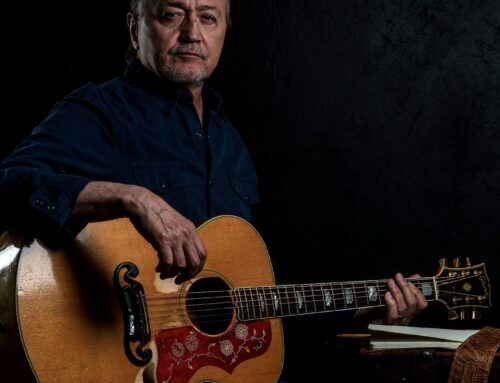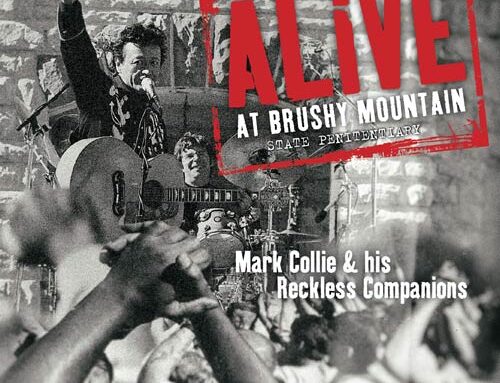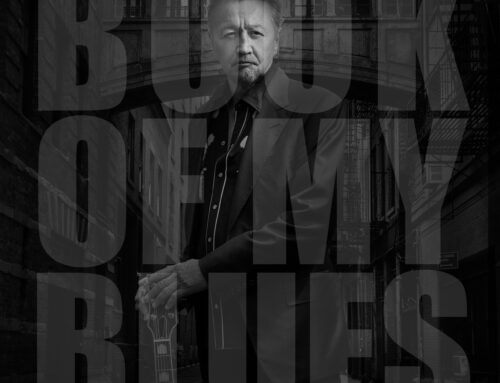Veteran country singer/songwriter hoped to “maybe shine some light into some darker areas of our world.”
Perseverance usually pays off, and veteran singer/songwriter/actor Mark Collie’s latest project is proof. It’s been 15 years since Collie visited Brushy Mountain State Penitentiary to perform for inmates at the maximum-security Tennessee prison. That recording is finally being released as Mark Collie & His Reckless Companions: Alive At Brushy Mountain State Penitentiary drops Friday (Oct. 14) via Eagle Rock Entertainment.
During his visits to Brushy, Collie also filmed a documentary, The Mountain, a powerful look inside the walls of one of the country’s most notorious correctional facilities, until it closed in 2009. It airs this weekend on TheBlaze Network and will be available for purchase next week.
“I didn’t know when I started up the mountain it was going to be a 15-year journey for all these pieces to come together. I don’t regret it at all, but when I went in, if I knew it was going to be 15 years, I might have went on into Knoxville, got something to eat and went to a ballgame for the weekend,” Collie says with a laugh.
Instead, Collie followed in the footsteps of his friend Johnny Cash, whose live albums at Folsom Prison and San Quentin are legendary. “I wanted to do something that would make a difference,” the Tennessee native tells Billboard. “In the beginning, it was just me and my guitar and I felt like if we could document those visits and evolutions of it then I could share that when it was finished and maybe shine some light into some darker areas of our world. I hope it might change one life for the better.”
Collie, who portrayed Cash in the film I Still Miss Someone, talked to both Cash andMerle Haggard about his project at Brushy. “What a lot of people don’t know was Merle was an inmate the first time Johnny went to San Quentin,” Collie says of a 20-year-old Haggard hearing Cash perform in 1958. “When I had a chance to talk to Merle about it, he talked about how he heard that Johnny Cash was coming, how excited he was and how much they anticipated somebody coming to visit and bring songs, laughter and joy. Merle said that he remembered that made a difference. He changed his rage to music and then he became Merle Haggard. All the great body of work and contributions he made to our popular culture, especially just the country format, would not be the same without
When Collie originally began working on the Brushy Mountain project, he was signed to MCA Records, where he released four albums in the ’90s. His producer, Tony Brown, and Bruce Hinton, who headed the label at the time, were enthusiastic about Collie’s prison project. “I wanted to make a live record, shoot a live concert and a documentary film together,” he recalls. “I didn’t know that it was rather impossible to do on a record and video budget, but I was going to try. As the project began to get close to completion, Bruce Hinton retired and Tony moved from MCA to the new label Universal South. … Nobody at MCA was interested in completing the project, so it went into limbo and it took me a couple years to figure out a way to find resources to get it back.”
Collie then faced a bigger challenge than record label politics: During the devastating flood that hit Nashville in 2010, the film was nearly destroyed. “It had been underwater during the flood for a couple of weeks, so once we did recover the footage, it was painstaking to restore frame-by-frame with the help of John Lloyd Miller and a lot of great people who knew how to do that around the country,” Collie says. “We lost a few frames here and there, so sometimes in the footage, it seems to jump. It’s not because we weren’t trying. It’s because those frames don’t exist.”
As they contemplated their next move, Collie and his wife Tammy decided to return to Brushy and follow up with the inmates. “Tammy and I were talking about it and looking at what we had. It was obvious that the story wasn’t complete,” he says. “There was an opportunity to find out how much the music mattered, so we began to go find people who participated in the interviews, who shared their stories and testimonies and we found several guys who had gotten out and who were willing to talk about it, so you can see me age about 13-15 years in process.”
Though the Brushy Mountain project hasn’t delivered a Haggard yet, when Collie did follow up interviews with inmates, at least one is pursuing a songwriting career. Andrew Dixon has since been released from prison and has five songs in the upcoming film Heart Baby, a biopic of convict and boxer George Lee Martin. Dixon even landed a small role in the film. “I think it’s God’s way of maybe showing that there are second chances,” says Collie. “There is hope and redemption and you can find the way to that through a song.”
A well-respected songwriter, Collie has written songs for McGraw, J.T. Hodges,Aaron Tippin and Garth Brooks, among others. For Alive At Brushy Mountain State Penitentiary, Collie penned tunes specifically for the project. “’Maybe Mexico’ and ‘Reckless Companion,’ those were written for the project,” he says, “and even before I made my first visit to Brushy, I was considering songs to perform or sing for them.”
Collie is excited about people finally having a chance to see and hear the projects from Brushy. The live album had a limited release a couple years ago on Wilbanks Entertainment, and Collie credits CEO Tim Wilbanks for helping keep hope for the project alive. Ultimately, landing with Eagle Rock brings the project full-circle. Earlier this year, Universal released a Collie greatest-hits package as part of their Icon series, and that led to conversations with Eagle Rock. “Eagle Rock is a Universal company now and it’s a live record. They do a lot of live records and it just made sense,” he says. “They do mostly rock ‘n’ roll records. I think this is the first country record. I’m proud to have Eagle Rock involved because they get it and like it. It’s also sort of come full-circle because the record started at MCA Universal and now that’s the distributor.”
Collie is hoping the documentary and live album will help foster a dialogue about the prison system and rehabilitation. In the latter part of the film he’s seen talking to a corrections official about issues, including recidivism. “I talk with as many men and women as I can who are trying to find some new and better ways to approach prison outreach,” says Collie. “I’m sure I’ll be doing this on some level the rest of my life. I hope so. There are a lot of organizations that I’m in conversations with just to share what I’ve learned and what I believe, but at the same time I’m trying to get back focused on making a new studio record. Until I could complete this film and record project, I’ve just never been inspired to do a new record. I’ve done film projects and done enough television [most recently the role of Frankie Gray on the TV series Nashville]. I want to get back to making another record and one that can perhaps express some of the things I’ve learned about life.”






